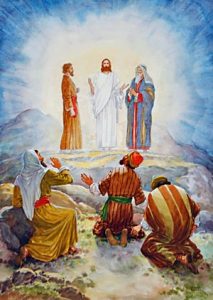Lesson for July 5-11
Our Father God has received much bad press over the centuries. Satan has portrayed Him as a harsh, vengeful dictator. (There are conflicting ideas on what constitutes the final punishment of the wicked, for instance.) But Jesus’ ministry and sacrifice did much to erase those distorted perceptions of the Father.
At the same time, Satan has worked overtime in obscuring who Jesus, the Son of God, is. As with the many confusing ideas on the trinity, there is also much spiritual wrangling over the nature of Jesus Christ. Does it really matter which religious camp we belong to?
Our lesson study this week will make it clear that it matters immensely. It is totally useless for us to repeat what other people believe about any of these doctrines. We must have answers that reflect our own personal beliefs, based on what Jesus Himself taught.
When someone asks you, as Jesus asked His disciples, “But who do you say I am?” what will your response be?
Key Text: “‘For even the Son of Man did not come to be served, but to serve, and to give His life a ransom for many'” Mark 10:45 NKJV
This verse speaks to me of Jesus’ humanity (He came to minister and serve us in the flesh), but also of His divinity. Only a divine Being could pay the ransom for sin. He had to be totally God, but also totally human, in order to accomplish His mission. But we’ll see why this was so, as we study God’s Word this week.
Sunday: The Son of Man
The term Son of Man was a designation that Jews recognized as referring to the Messiah. Daniel 7:13, 14 definitely pointed them in this direction:
“I saw in the night visions, and, behold, one like the Son of man came with the clouds of heaven,and came to the Ancient of days, and they brought him near before him. And there was given him dominion, and glory, and a kingdom,that all people, nations, and languages, should serve him: his dominion is an everlasting dominion, which shall not pass away, and his kingdom that which shall not be destroyed.” KJV
By Jesus quoting the verse above in Matthew 24:30, He tied the event with His discourse on the Second Coming which occurs at the end of the world. His disciples had asked Him specifically to tell them “what shall be the sign of thy coming, and of the end of the world?” v. 3
Numerous other times in the Gospels Jesus referred to Himself as the Son of man–more than eighty times, as a matter of fact. By doing so, He seems to emphasize His humanity, which certainly shouldn’t be disputed. Scripture testifies that, while on earth, Jesus:
- was born as a baby (Luke 2:6, 7)
- grew up as a child (Luke 2:40, 52)
- had brothers and sisters (Matthew 13:55, 56)
- ate (Matthew 9:11)
- slept (Luke 8:23)
- was tired (John 4:6)
- was hungry and thirsty (Matthew 4:2 and John 9:28)
- experienced sorrow and distress (Matthew 26:37)
Jesus did seem to favor this title Son of man for Himself. But we must not forget that He was constrained by the religious authorities to be careful in revealing His divine role prematurely. His life was in constant danger for this reason.
One might also assume that Jesus also loved His title, the Son of man (the Messiah), because it connected Him with the humanity that He came to serve and ultimately save.
Discussion Questions: How does understanding Jesus’ humanity calm the fears that humans may have toward God?
What implications does Jesus being fully human have for our salvation and battles with sin?
How does the humanity of Jesus uphold God’s need to prove Himself both fair and loving before the universe?
Monday: The Son of God
While on earth Jesus voluntarily took a subordinate role to the Father. See Philippians 2:6-8 (“took upon him the form of a servant” and “humbled himself, and became obedient unto death”).
But this in no way minimizes the fact that He and the Father were still one in purpose, will, and objectives. Some quotes from Jesus reveal this special, unified relationship:
- “I and my Father are one.” John 10:30 KJV
- “…Verily, verily, I say unto you, The Son can do nothing of himself, but what he seeth the Father do:…” John 5:19 KJV
- “The Father loveth the Son, and hath given all things into his hand.” John 3:35 KJV
- “All things are delivered unto me of my Father: and no man knoweth the Son, but the Father; neither knoweth any man the Father, save the Son, and he to whomsoever the Son will reveal him.” Matthew 11:27 KJV
A concordance search for the times when Jesus called Himself the Son of God yields few, if any, results. As mentioned earlier, He preferred the title Son of man. But even these declarations, and similar statements and actions, were enough to almost get Him stoned on many occasions.
We do have the testimony of many, including God the Father Himself, proclaiming that Jesus had a valid claim to divinity, that He truly was the Son of God AND the Son of Man.
- When Jesus was gathering His small group of followers, Nathanael greeted Him with the words: “Rabbi, thou art the Son of God; thou art the King of Israel.” John 1:49 KJV
- After Jesus walked on water, the disciples’ response was: “Then they that were in the ship came and worshipped him, saying, Of a truth thou art the Son of God.” Matthew 14:33 KJV
- Just before He raised her brother Lazarus up to life, Martha affirmed Jesus’ divinity: “I believe that thou art the Christ, the Son of God, which should come into the world.” John 11:27 KJV
- Right after He died on the cross, a centurion spoke out, “Truly this man was the Son of God.” Mark 15:39 KJV
Discussion Questions: God the Father acknowledged Jesus as His Son at His baptism (Matthew 3:17) and at the Mount of Transfiguration, pictured here (Matthew 17:5). Why do you think God chose these two times in Jesus’ lifetime to make these affirmations of His identity? To whom and for what reason did the events occur?
Read and contemplate Deuteronomy 29:29: “The secret things belong unto the Lord our God: but those things which are revealed belong unto us and to our children for ever, that we may do all the words of this law.” KJV What kind of “secret things” do you think this verse is speaking about?
Is it possible to waste too much time trying to rationalize certain doctrinal topics? How do we know when a teaching just needs to be taken by faith? Does this vary with individuals?
Tuesday: Divine Nature, Part 1
Some are troubled by the fact that Jesus never left a public record saying that He was God or even the Messiah. Any reading of the Gospels, however, reveals the number of times that He was almost stoned, mobbed, or had His life threatened for even implying that He was equal with God. See Luke 4;16–30 and John 5:18.
We’ve heard it said that actions speak louder than words. If Jesus had spoken directly about being God, would that be proof that He was God? Of course not. Anyone can claim to be anyone they want. Jesus left us evidence of His divinity by the selfless acts of miraculous healing and even forgiving that He did while on earth.
The story is told in Luke 5:17-26 of a man whose bed was lowered through the roof, in order for him to get near Jesus and be healed. But Jesus surprisingly forgave his sins first. This led to the scribes and Pharisees saying, “Who is this which speaketh blasphemies? Who can forgive sins, but God alone?” v. 21 KJV
Another time the Jews tried to press Jesus into confessing who He was. “How long does thou make us to doubt? If thou be the Christ, tell us plainly.” John 10:24 KJV In verse 30, Jesus gives them the answer they are seeking. He said plainly, “I and my Father are one.” Their prompt response to this was to begin stoning Him. While they were picking up stones, however, Jesus asked them for what works He was being stoned? They replied:
“…For a good work we stone thee not; but for blasphemy; and because that thou, being a man, makest thyself God.” John 10: 33 KJV
Discussion Questions: Why would Christ’s deity be considered the foundation of our Christian faith?
How does it affect my salvation and influence my mission in life? [gives me confidence that He can save me, provides the power to overcome sin and spread the gospel]
Wednesday: Christ’s Divine Nature, Part 2
Other times that Jesus declared His divine nature included:
- John 11:25 “…I am the resurrection, and the life:…”
- John 3:13 He “…came down from heaven…”
- John 17:5 “O Father, glorify me with thine own self with the glory which I had with thee before the world was.”
One can’t help but recognize the theme of John’s Gospel. He is intent on conveying the divinity of Christ to his readers. Those who insist on denying that deity, after reading all the Gospels, would seem to be calling Jesus either a liar or a charlatan. There can be no other explanation for His behavior and bold claims, which to the Jews were seen as blasphemy (irreverently claiming the attributes of God).
One of the most controversial statements by Jesus, that once again almost got Him stoned, was the time when He was in the temple and they were following Him, pounding Him with questions that would reveal His identity so they could kill Him. Jesus stated clearly to them in John 8:58: “…Verily, verily, I say unto you, Before Abraham was, I am.”
Nothing would have been more blasphemous to the Jews than using the simple phrase “I am”. It went back to the time of Moses, when Moses asked God for His name. It implied His continuous existence:
“And God said unto Moses, I AM THAT I AM: and he said, Thus shalt thou say unto the children of Israel, I AM hath sent me unto you.” Exodus 3:14 KJV
Other times Jesus accepted worship, something that even angels wouldn’t do. See Revelation 22:8, 9 to find John being told by an angel not to worship him, but God only. Jesus Himself thwarted one of Satan’s temptations by affirming “…Thou shalt worship the Lord thy God, and him only shalt thou serve.” Matthew 4:10 KJV
But here are some of the times when Jesus accepted worship, something He would only do if He were truly God:
- the disciples on the sea (Matthew 14:33)
- the healed blind man (John 9:38)
- the women at Jesus’ tomb (Matthew 28:9)
Thomas, when He declared “My Lord and my God!” (John 20:28), would not have spoken these words unless he clearly believed that Jesus was God.
Discussion Questions: Many ancient gods and goddesses claimed to be half human and half god. Why was it necessary for Jesus to be fully human and fully divine, even though this is more difficult for us to rationally understand?
What happens if we neglect or undervalue either Christ’s humanity or His divinity? What kind of thinking would it encourage?
Thursday: Christ’s Mission
When one finds a mission in life, it only makes sense to know the identity of the person who gave you that mission. If our mission is to attain eternal life by spreading the gospel and following a particular world leader, we must know the identity of that leader, which for us is Jesus Christ. See John 17:3 (“…life eternal, that they might know thee…”).
We have been shown that Jesus’ identity incorporates both divinity and humanity in the most perfectly balanced way possible. He was fully God and fully man. Also, knowing Jesus’ mission will give us insight for what our mission should be.
- Luke tells us that Jesus, the Son of man, “is come to seek and to save that which was lost.” Luke 19:10
- John states that He was sent to reestablish our relationship with God (“…ye shall see heaven open, and the angels of God ascending and descending…” John 1:51).
- Matthew says He came to forgive our sins (“…my blood…which was shed for the remission of sins.” Matthew 26:28).
- Peter wants us to remember that He set us an example for how to live (“…leaving us an example, that ye should follow his steps:” I Peter 2:21).
- And finally, John also claimed that His life and death brings us everlasting life (John 3:16).
The mission of Jesus Christ might be seen as twofold. It is both redemptive and transformational.
- The redemption takes care of our past (justifying our all-too-sinful human lives),
- and the transformation is the sanctifying change that takes place in our future (acquiring a divine nature through the Holy Spirit, enabling us to overthrow sin–I Peter 1:4 “…that ye may be partakers of the divine nature…”)
Discussion Questions: How does understanding Christ’s identity affect our understanding of HIS mission?
How do Jesus’ divinity and humanity affect OUR mission and purpose for life? Just what is that mission?
Why is it important for a church to not only win souls, but to provide a haven for nurturing and growing those same souls? How can your church do better in both these areas?
How can we call sinners to repentance without appearing self-righteous?
Summary
The name Christian implies that we know Christ. Jesus asked His disciples, back then and now, “‘But who do you say that I am?'” Matthew 16:15 NKJV. Our eternal destiny hinges on our reply to that question.
Many have always misunderstood who the Messiah was, but we must by faith accept Him for who He was. He was fully human and fully divine, a concept that Satan has tried to dispute throughout earth’s history, causing much confusion and heretical doctrines to appear.
Emphasizing one or the other of Jesus’ nature leads to misconceptions about His mission and His ability to save us. His humanity shows that God understands our trials and temptations. His deity demonstrates that humans can’t save themselves.
Challenge
- They say that the best place to understand Jesus was at the foot of the cross. Meditate on His sacrifice this week.
- Then contemplate your own mission in life and how it matches the example Jesus set for us while on earth.
Next week: The Holy Spirit
To read the Sabbath School lesson or for additional resources, see www.ssnet.org










